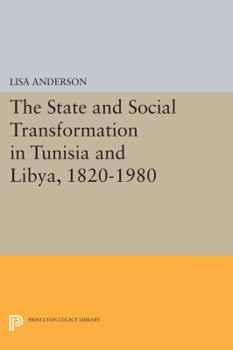The State and Social Transformation in Tunisia and Libya, 1830-1980
Select Format
Select Condition 
Book Overview
The book traces growing state intervention in the rural areas of Tunisia and Libya in the middle 1800s and the diverging development of the two countries during the period of European rule. State formation accelerated in Tunisia under the French with the result that, with independence, interest-based policy brokerage became the principal form of political organization. For Libya, where the Italians dismantled the pre-colonial administration, independence...
Format:Paperback
Language:English
ISBN:0691601801
ISBN13:9780691601809
Release Date:July 2014
Publisher:Princeton University Press
Length:352 Pages
Weight:1.09 lbs.
Dimensions:0.7" x 6.1" x 9.2"
Customer Reviews
1 rating
a Challenge to Modernization Theory
Published by Thriftbooks.com User , 22 years ago
While most states of the Middle East region have pursued policies that more or less approached the prescriptions of the Modernization type meta-theories, there has been the general perception, from within and without, that the region as a whole has failed to live up to the promise of social and economic welfare that modern development was supposed to generate. The political advancement of the Region toward more pluralistic or democratic forms of government that was supposed to proceed as the inevitable result of economic and industrial transformation has been even more disappointing and lagged far below material achievements. In The State and Social Transformation in Tunisia and Libya 1830-1980 Lisa Anderson has rejected the mainstream meta-theoretical approaches to the study of the nature of development in the Middle East. Through a process of historical analysis of the socio-economic mechanisms that have characterized the nature of Libya and Tunisia's different paths of social and political transformation, Anderson has emphasized the study of state formation processes and the particular nature of a peripheral's state integration in the world capitalist system. Anderson has challenged both of the principal development meta-theories that became popular in the decades after WWII. She has contested Modernization theory's interpretation of development moving in a linear pattern through predictable stages to inevitably culminate in the establishment of a democratic capitalist state modeled on the pattern of the West. She has noted that development is not achieved without cost and that social conflict is a necessary outcome as the State balances its monopoly of authority as it coerces and encourages different social and economic actors to achieve a relative degree of stability and equity. In order to achieve this and promote a real degree of social transformation an efficient bureaucracy and public administration are crucial. Accordingly, her study has shown the contrasting development patterns of Libya and Tunisia. In the former, Anderson has stressed the persistence of kinship based societal relations and null bureaucratic development during the period of Italian colonization and the perpetuation of this pattern after independence. Oil rents made it possible for the Libyan administration to rely almost exclusively on its distributive capacity to prevent the establishment of efficient institutional and bureaucratic machinery; consequently, society and political development have not progressed toward the formation of a modern state in the Weberian sense.





